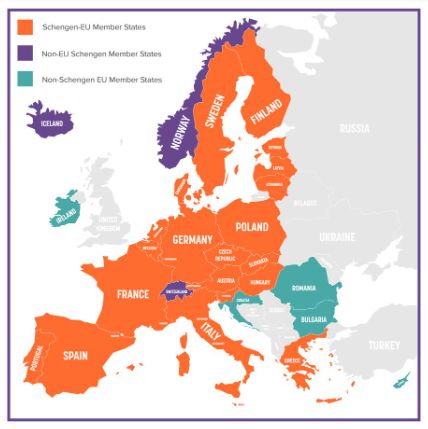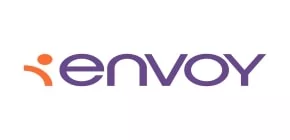The Schengen Zone consists of 26 member states across Europe. In some cases, Schengen member states are also members of the European Union (EU), with the exception of Ireland, Switzerland, Iceland, Norway and Liechtenstein. The Schengen region is a group of European countries that are united politically and economically by the Schengen Agreement.
Schengen countries have a reciprocal travel and free movement arrangement, that functions as a unified jurisdiction for the purposes of international travel and share a common visa policy. This grants free movement to over 400 million citizens of the EU, along with non-EU nationals who are living in the EU or visiting as exchange students, business travelers or tourists. Free movement allows EU citizens to live and travel in an EU country without being subject to entry restrictions and border control policies that impact non-EU citizens.
Below is a map highlighting the visa requirements for nationals from Schengen and EU member states, travelers from EU only member states and travelers from Schengen Area only member states.

Schengen-EU Member States
Schengen member states have a reciprocal entry visa system, which means that a Schengen Visa issued by one country is valid for travel and transit across the entire Schengen region.
Non-EU Schengen Member States
Travelers from Schengen member states who are not in the European Union (Non-EU Schengen Member States) will be subject to additional border checks. When a non-EU national requires a visa, the Schengen Visa permits short-term stays and travel through the Schengen Area.
Travelers from these countries may be able to benefit from visa-free travel arrangements made with EU member states.
Non-Schengen EU Member States
Travelers arriving from a country that is not a Schengen member state may be subject to additional immigration checks and will be required to present proof of identification.
Looking Ahead
Several countries throughout Europe are expected to complete accession to the Schengen Area in the coming years. Most recently, the government of Croatia has taken steps towards becoming a member state. However, a number of conditions will need to be met before this process can be completed.
The European Commission also plans to introduce the European Travel Information and Authorization System (ETIAS) in May 2023. Under this system, third-country visa-exempt nationals will be required to register their travel prior to traveling to a Schengen member state.
Originally published 13 June 2022
The content of this article is intended to provide a general guide to the subject matter. Specialist advice should be sought about your specific circumstances.

